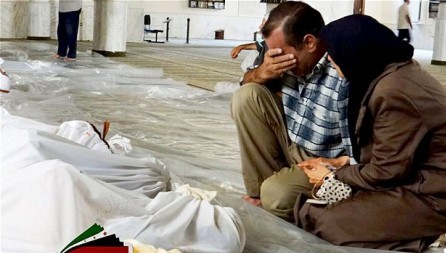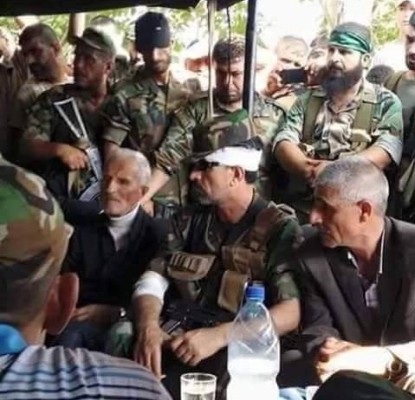PHOTO: A man cries over victims of the August 2013 chemical attacks near Damascus
LATEST
- Rebels Claim Further Advance in Key Offensive in Hama Province
- Jaish al-Islam Rebels Call for Revenge on Latakia for Hezbollah-Regime Offensive on Zabadani
- Kurdish Militia YPG: Turkey Handed Over 6 of Our Injured Fighters to Jabhat al-Nusra
- Prominent Syrian Commander “The Tiger” Wounded, Deputy Killed
- Regime Bombardment Damages Hospital in Idlib Province
- Video: Aleppo Revolutionary Council Elects 50 Officials
SATURDAY FEATURE
“Peace Talks” — What Did Saudis Tell Assad’s Top Security Advisor?
Almost two years after the Assad regime’s chemical attacks that killed up to 2,000 near Damascus, the UN Security Council has approved an enquiry to determine responsibility.
In an unanimous vote, the Council requested the UN Secretary-General, in coordination with the Director-General of the Organization for the Prohibition of Chemical Weapons (OPCW), to submit recommendations for the establishment of a Joint Investigative Mechanism.
The Mechanism, established for one year with a possibility of future extension, will be tasked with identifying “individuals, entities, groups, or governments involved in the use of chemicals as weapons, including chlorine or any other toxic chemical”.
The vote was scheduled after US Secretary of State John Kerry said on Thursday that Russian Foreign Minister Sergei Lavrov had agreed on the text of the resolution, indicating that Moscow would not veto it.
Previous investigative teams, including the inspectors after the August 2013 attacks and the OPCW teams looking into subsequent airdrops of chlorine, have been barred from ascribing responsibility.
In March 2015, the Council expressed deep concern over toxic chemicals such as chlorine, following the conclusion with a “high degree of confidence” by an OPCW Fact-Finding Mission that they had been used.
Rebels Claim Further Advance in Key Offensive in Hama Province
Rebels are claiming another gain in the important offensive in the al-Ghab Plain in Hama Province.
The Jaish al-Fateh coalition said that it has taken the village of al-Msheek, as it presses farther towards key regime bases in Joureen between Hama and Latakia Province.
The rebel operations:
An English-language summary, including a report by pro-opposition journalist Hadi al-Abdallah, of gains earlier this week:
The two-week rebel offensive has claimed the last major regime position — the town of Frikka — in neighboring Idlib Province and moved farther into the Plain, which connects Hama with Assad strongholds in Latakia Province.
The rebels have fended off a brief regime counter-offensive, and on Thursday they claimed key positions in the Plain, including the town of Qarqur. They are now close to Joureen, where the Syrian military and Hezbollah have the bases shielding Latakia and carrying out bombardment of Idlib and Hama.
See Rebels Continue Important Advance Through Hama Province, Closing on Assad Stronghold of Latakia
Syrian warplanes have retaliated with the bombing of the Zayzoun thermal power plant, one of Syria’s largest, near Frikka. The bombardment briefly drove rebels out of the complex last week, but they regained it during their latest advances.
Jaish al-Islam Rebels Vow Revenge on Latakia for Hezbollah-Regime Offensive on Zabadani
Abdurahman Harkoush reports:
Rebels have again promised action to counter the five-week Hezbollah-regime attempt to take the town of Zabadani, northwest of Damascus.
In a statement on Wednesday, the leading rebel faction Jaish al-Islam said it supported the halt of negotiations to evacuate Zabadani — suspended by the faction Ahrar al-Sham, appointed by resident to lead the talks, with the claim that Iran is pursuing sectarian cleansing of populated areas.
Captain Islam Alloush, the Jaish al-Islam spokesman, called for a military operation to support Zabadani. This could be either in the north or the south of the country, where rebels have open supply lines with neighboring countries such as Turkey and Jordan.
(Jaish al-Islam, based near Damascus in the East Ghouta area, are unable to launch an operation because of siege by the Syrian military.)
On Saturday, a statement issued by Alloush via Twitter said rebels should carry out rocket attacks on Latakia city, considered a base of support for the Assad regime, on the Mediterranean. Hours later, Jaish Al-Islam issued a video of two Grad rockets being fired at “the military port in Latakia”.
Meanwhile, Jaish al-Islam leader Zahran Alloush has given a speech addressing concerns about the faction’s handling of the siege on East Ghouta.
Responding to a video Sheikh Khaled Tayfour from the Ajnad al-Sham faction, accusing Alloush of “dictatorship”, the Jaish al-Islam leader Alloush blamed Ajnad al-Sham for the trouble in the area. He said Ajnad al-Sham had increased the suffering of people by exploiting a tunnel which connects East Ghouta with the Damascus suburb of Barzeh, stockpiling 1000 tons of food and more a million liters of fuel while civilians have to pay extortionate prices for bread and oil.
The commander called for a committee to investigate warehouses, beginning with those of Jaish al-Islam, whom he said had less than a week of food.
Alloush said that he did not want in-fighting and blood to be spilled, and that matters should be resolved sensibly. He offered to resign, with Jaish al-Islam pulling out of the area, if that was the wish of the people.
There have been demonstrations in recent months in East Ghouta over the supply and price of food and basic goods and the detention of local men. Jaish al-Islam has responded that inflation is largely due to the siege conditions, with some merchants taking advantage by raising prices, and that those detained have connections to the Islamic State.
Video, posted on Friday, of a demonstration:
In addition to fighting the regime — including the elite 4th Division, the Republican Guards, and Iraqi and Lebanese militia — in East Ghouta, Jaish Al-Islam has been facing both the Syrian military and the Islamic State to the north in the eastern Qalamoun region. The rebels are facing the cut-off of supply lines from both the north and the south.
Kurdish Militia YPG: Turkey Handed Over 6 of Our Injured Fighters to Jabhat al-Nusra
The Kurdish militia YPG has said that Turkey handed over six of its injured fighters to the Islamist faction Jabhat al-Nusra.
The YPG’s Kobane Command said in its statement that the men were being treated in Bakurê in the north of Syrian Kurdistan for wounds suffered in the offensive against the Islamic State. Contact was lost with the fighters, but the militia said it had information that Turkish authorities handed the men to Jabhat al-Nusra at the Bab al-Hawa border crossing in Idlib Province.
The YPG demanded an urgent explanation from Ankara.
Prominent Syrian Commander “The Tiger” Wounded, Deputy Killed
Colonel Soheil “The Tiger” al-Hassan, one of the most prominent field commanders in the Syrian military, has been wounded and his deputy killed by a rebel mortar attack in the fighting in the al-Ghab Plain in Hama Province.
Colonel Ali al-Hajji, who led Qawat Al-Fahoud (Cheetah Forces) died as rebels moved into the town of Qarqur on Thursday.
Pro-regime outlets confirmed the news, which circulated on social media on Friday with a photograph of Colonel Hassan and his head wound:
Another officer in the camp was killed.
Al-Hajji was renowned among regime supporters as one of the commanders in the lifting of the rebel siege of Aleppo Central Prison in early 2014.
Regime Bombardment Damages Hospital in Idlib Province
Regime airstrikes have damaged the al-Shifa Hospital in Saraqeb in Idlib Province.
The Local Coordination Committees reported casualties among the 26 victims in the province in northwest Syria on Friday.
Regime forces have been pushed out of almost all of the province, holding only two enclaves and an isolated, unusable base, since March.
#Syria, #Idlib: Aftermath photos showing the destruction of al-Shifa hospital's entrance and operating room. #Saraqeb pic.twitter.com/5xxrIjEmSn
— Sakir Khader (@sakirkhader) August 7, 2015
Video: Aleppo Revolutionary Council Elects 50 Officials
Men and women in the rebel-held part of Aleppo, Syria’s largest city, meet to elect local officials:


